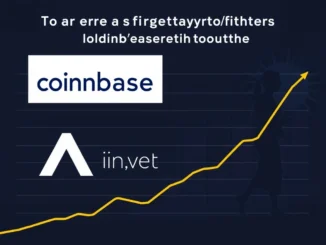
Get ready to dive into a significant development shaking up the crypto world! The financial giant BlackRock, through its iShares Bitcoin Trust (IBIT), has reached a major milestone. Reports confirm that the fund now controls over 3% of the entire circulating Bitcoin supply. This isn’t just a number; it represents a substantial portion of one of the world’s most sought-after digital assets held by a traditional finance powerhouse. It underscores the growing trend of Institutional Bitcoin adoption and the impact of the newly approved spot Bitcoin ETF products in the United States.
What Does Holding Over 3% of the Bitcoin Supply Mean?
Think about it: Bitcoin has a capped supply of 21 million coins that will ever be mined. While not all of that is currently circulating or accessible, 3% is a considerable chunk. According to data highlighted by Unfolded on X (formerly Twitter), the IBIT Bitcoin holdings have steadily climbed, crossing this 3% threshold.
This level of accumulation by a single entity, especially one as large and influential as BlackRock, carries significant weight:
- Demand Signal: It demonstrates robust, sustained demand from the types of investors who typically access markets through traditional financial products like ETFs.
- Supply Dynamics: With a finite asset like Bitcoin, large holders effectively reduce the available supply on the open market, which can influence price dynamics if demand remains constant or increases.
- Validation: BlackRock’s massive holding acts as a strong validation for Bitcoin as a legitimate asset class in the eyes of mainstream finance.
How Has the BlackRock Bitcoin ETF Achieved This?
The rapid accumulation by the BlackRock Bitcoin ETF, IBIT, is primarily driven by consistent and significant inflows of capital since its launch in January 2024. While some initial inflows into spot Bitcoin ETFs were offset by outflows from older structures like the Grayscale Bitcoin Trust (GBTC), IBIT quickly emerged as a leader in attracting fresh capital.
Reports indicate that IBIT has seen net inflows nearly every trading day for an extended period. The fact that the fund has reportedly not sold any Bitcoin since June, as mentioned in the initial report, further highlights its strategy of accumulation based on investor demand flowing into the fund.
The Broader Impact of Institutional Bitcoin Accumulation
The rise of IBIT and other spot Bitcoin ETFs represents a paradigm shift. Before these products, gaining exposure to Bitcoin for large institutions or even retail investors within traditional brokerage accounts was complex. Now, it’s as simple as buying shares in an ETF.
This ease of access has unlocked a new wave of investment. While individual retail investors contribute, a substantial portion of the billions flowing into IBIT likely originates from:
- Hedge funds
- Wealth managers
- Family offices
- Institutional portfolios
Their participation is crucial because they manage vast amounts of capital. Their sustained interest, reflected in the growing IBIT Bitcoin holdings and other ETFs, can provide a more stable and larger demand base for Bitcoin compared to relying solely on retail speculation.
Are There Challenges or Considerations with Such Large Holdings?
While the accumulation is largely seen as positive for Bitcoin’s adoption narrative, it’s important to consider potential implications. A significant concentration of Bitcoin supply in the hands of a few large ETF providers raises questions, although 3% held by IBIT is far from a majority.
Considerations include:
- Market Influence: While ETFs primarily buy based on inflows, a hypothetical large redemption event could theoretically lead to significant selling pressure, although ETFs are structured to handle redemptions efficiently.
- Centralization Concerns: Some in the crypto community value decentralization. Large amounts of Bitcoin held by centralized entities like BlackRock contrast with this ethos, although the underlying Bitcoin network remains decentralized.
- Custody Risk: While BlackRock uses established custodians, any custody solution carries some level of risk, though major financial institutions employ stringent security measures.
Despite these points, the overwhelming sentiment surrounding the growth of the BlackRock Bitcoin ETF and its peers is positive, focusing on the validation and increased accessibility it brings to the asset class.
What’s Next for IBIT and Institutional Bitcoin?
The trend of accumulation shows no signs of slowing down significantly. As more financial advisors and institutions become comfortable recommending or allocating to spot Bitcoin ETFs, funds like IBIT are likely to see continued inflows.
The crossing of the 3% threshold for IBIT Bitcoin holdings is a milestone, but it may just be one of many as institutional adoption matures. The focus will be on whether this pace of accumulation is sustained and how it interacts with the future limited issuance of new Bitcoin, particularly after halving events.
Conclusion: A New Era for Bitcoin Supply Dynamics
BlackRock’s iShares Bitcoin Trust now holding over 3% of the total Bitcoin supply is a powerful indicator of institutional conviction in the digital asset. This massive accumulation, driven by consistent inflows into the BlackRock Bitcoin ETF, highlights the success of the spot ETF structure in bridging the gap between traditional finance and cryptocurrency.
While the concentration of holdings by entities like IBIT introduces new dynamics to the Bitcoin supply landscape, it fundamentally represents a significant step forward in Bitcoin’s journey towards mainstream acceptance and integration into global investment portfolios. The era of Institutional Bitcoin is here, and its impact on the market is becoming increasingly evident.



